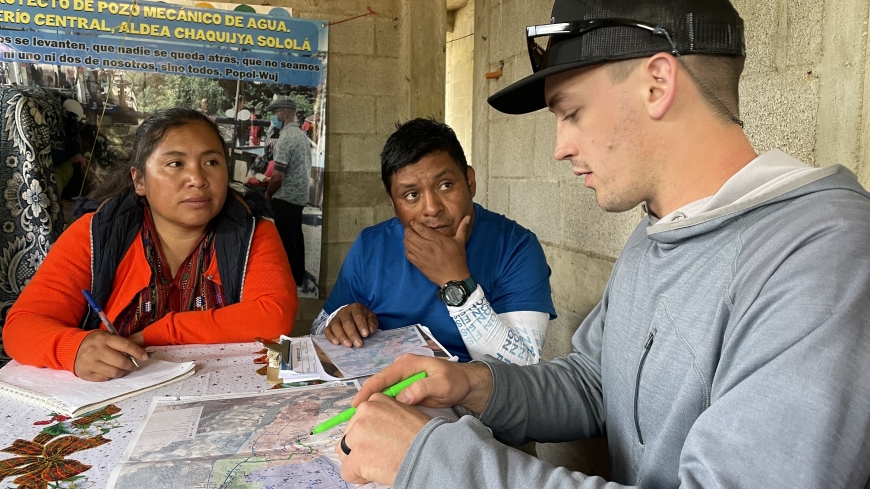Leadership as a Journey: Luke Thompson's Path from Student Volunteer to Board Member
Leadership rarely follows a straight line. For Luke Thompson, PE, Associate Water Engineer at HDR and board member with Engineers Without Borders USA (EWB-USA), the journey has been one of growth, reflection, and the courage to pause and listen.
Discovering Purpose Early On
Luke first glimpsed the power of community-driven work in high school on a trip with Plant with Purpose, where he saw sustainable development in action rather than short-term aid. That experience planted a seed that later drew him to EWB-USA when he began college at Montana State University.
“So when I was in college orientation, the ad and the video for Engineers Without Borders really caught my eye,” he recalls. “I got plugged in with the organization as soon as I could.”
Luke jumped straight into project work as a Sanitation Lead for projects in Khwisero, Kenya, where his chapter aimed to bring clean water and sanitation to all of the area’s local schools. It was inspiring, but also humbling. Composting latrines, for example, might not function well because the team had not fully built community capacity to maintain them. That experience showed him that engineering alone was not enough. Long-term success required listening, adapting, and ensuring communities were prepared to sustain projects long after volunteers had left.
Hard Lessons, Hard Choices
By his junior year, Luke had become chapter president. But when projects stalled and fundraising fell short, the team faced a hard truth. They needed to stop, reassess, and rebuild their approach from the ground up. That decision led to a transformative summit in Montana that brought Kenyan partners and students together to rethink their mission. Out of those conversations came Mkoko, an organization that continues today and was recently selected as one of EWB-USA’s purposeful partners in Kenya. It was proof that sometimes leadership means slowing down in order to create something more resilient.
“It forced us all to take a huge step back, stop all design work and reevaluate our project approach in Kenya. And that whole conversation and the steps we took afterwards resulted in a summit where we flew 10 of our Kenyan partners out to Montana to go through a facilitated workshop to develop a new mission, vision goals to develop an MOU, and ultimately the establishment of MKoko. ” Luke says. “That process was well worth it but hard. We had to cut our travel team down to a quarter of the original size but still had an opportunity to further grow our joint vision.
We spent that next summer in Kenya listening to all the program stakeholders to include the Ministry of health, primary schools, etc. to make sure the community owned and drove the effort and offering our support to further develop our partnership goals.”
Moving Into Mentorship
After graduation, Luke continued his education at Montana State University, pursuing an M.S. in Environmental Engineering. During thisd time Luke returned to volunteering with EWB-USA in a mentorship role. He worked with both the Montana Professional and MSU Student chapters, helping students learn from practicing engineers. He facilitated design reviews, guided project management discussions, and connected students with professionals who could offer insight.
That role grew into serving as the liaison between the Montana State student chapter and the Montana Professional chapter, and eventually into the role of Arizona State Representative after Luke graduated. Along the way, Luke discovered how much he valued creating connections between people at different stages of their leadership journey.
Building Trust in Guatemala
Those mentoring experiences shaped the way Luke approached professional work later on, especially in Chiquijyá, Guatemala. At HDR, he took on a leadership role in one of the EWB-USA’s most complex water supply projects that they were working in in partnership with HDR.
The challenges were significant, from budget concerns to water quality issues. But Luke knew from his student days that trust mattered as much as technical solutions. He and the team from HDR worked diligently with the team from Engineers Without Borders Guatemala (ISF Guatemala) “If we didn’t have ISF Guatemala, I don’t think we would have built nearly as much trust with the community,” he reflects.
He spent time in workshops and one-on-one conversations with community members, explaining the reasoning behind design decisions and listening closely to their concerns. That time on the ground built relationships and helped the project succeed, reinforcing his belief that leadership is rooted in listening first.
Serving on the Board
Today, Luke’s leadership journey has come full circle. As a member of EWB-USA’s Board of Directors, he brings together the lessons of student leadership, mentorship, and professional practice. “I wanted to get more engaged in the visioning work,” he explains. “How do we make sure we succeed and build a framework for students and volunteers that is resilient?”
Board service has given him the chance to shape policy and strategy in ways that can ripple across the organization for years to come. While he admits to feeling imposter syndrome at times, Luke finds it deeply rewarding to know his perspective is valued.
Lessons for Future Leaders
When asked what advice he would share with students and young professionals, Luke keeps it simple. “You make the best decisions when you listen,” he says. For him, leadership is not about pushing your own agenda but about building resilient efforts through collaboration.
He also encourages volunteers to lean on the broader EWB-USA network. “You don’t need to reinvent the wheel. There’s so much valuable context and infrastructure already in place. Use that so you can focus on the inspiring parts of the work.”
Leadership as an Ongoing Journey
Luke’s story is one of perseverance, humility, and growth. From Kenya to Montana to Guatemala, and from student volunteer to board member, his path shows that leadership is never about reaching a final destination. It is about continuing to learn, to adapt, and above all, to listen.
